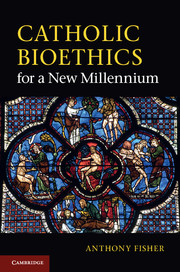Book contents
- Frontmatter
- Contents
- Foreword
- Abbreviations
- Introduction
- PART I How are we to do bioethics?
- PART II Beginning of life
- PART III Later life
- Chapter 7 Transplants: bodies, relationships and ethics
- Chapter 8 Artificial nutrition: why do unresponsive patients matter?
- Chapter 9 Endings: suicide and euthanasia in the Bible
- PART IV Protecting life
- Index
- References
Chapter 8 - Artificial nutrition: why do unresponsive patients matter?
from PART III - Later life
Published online by Cambridge University Press: 05 June 2012
- Frontmatter
- Contents
- Foreword
- Abbreviations
- Introduction
- PART I How are we to do bioethics?
- PART II Beginning of life
- PART III Later life
- Chapter 7 Transplants: bodies, relationships and ethics
- Chapter 8 Artificial nutrition: why do unresponsive patients matter?
- Chapter 9 Endings: suicide and euthanasia in the Bible
- PART IV Protecting life
- Index
- References
Summary
Introduction to the contest
In 2005, following a series of interventions by family, doctors, lawyers, courts, politicians and the media, all nutrition and hydration were removed from Terri Schiavo. She had been diagnosed as being in a ‘persistent vegetative state’ (PVS) but with tube feeding looked like living for many more years. Without it she died, on 31 March 2005, aged 41.
Schiavo’s is one of a string of legal cases in the United States, Canada, Britain, Italy and Australia regarding assisted feeding and hydration. Because modern Western cultures are so divided over issues of human nature, life and death, dignity and rights, relationships and social responsibilities, such cases are given a high profile. Certain fundamental differences that might once have been recognized as arguments in metaphysics, ethics and religion are now played out in hospitals, courts and the media. Underlying conflicts of values and beliefs are often left unidentified, with people talking at cross-purposes, each assuming the other is homicidal or vitalist, authoritarian or uncompassionate.
- Type
- Chapter
- Information
- Catholic Bioethics for a New Millennium , pp. 213 - 247Publisher: Cambridge University PressPrint publication year: 2011



